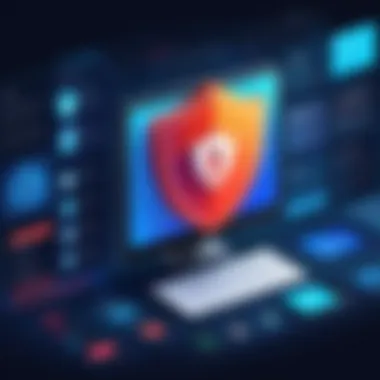Top Free VPNs for Concealing Your IP Address


Intro
In today's digital world, the need for online privacy has become increasingly important. Many users want to hide their IP addresses to protect personal data and maintain anonymity while browsing. This is where free VPN services come into play. This guide explores the best free VPNs available for concealing IP addresses and offers insights into their features, performance, and usability.
Understanding how VPNs work is essential. They create a secure connection between your device and the internet by routing traffic through a remote server. This process masks your actual IP address, allowing for anonymous browsing. While many VPNs come with various costs, a selection of quality free options exists, making privacy accessible to a broader audience.
Users should be aware that free VPNs often come with limitations. These can include slower connection speeds, data caps, and a restricted choice of servers. It is crucial to weigh the pros and cons before settling on a service. The following sections delve into product overviews, performance analyses, and user experiences, ensuring a comprehensive understanding of these free VPNs.
Preface to VPNs
The exploration of virtual private networks (VPNs) is essential for understanding online privacy and security. With the increasing threats to data integrity and user privacy, VPNs have become crucial tools for individuals and organizations alike. This section introduces basic concepts surrounding VPN technology, detailing its functionality and its pivotal role in obscuring personal information online.
What is a VPN?
A virtual private network (VPN) is a service that establishes a secure, encrypted connection between a user's device and a remote server operated by the VPN provider. By routing your internet traffic through this server, a VPN masks your original IP address, making your online actions more difficult to trace. This functionality is vital for protecting user data from hackers, malicious websites, and surveillance by third parties. Essentially, a VPN serves as a shield for your internet activity, keeping it private and secure.
How VPNs Work
VPNs operate by creating a secure tunneled connection between two endpoints. When a user connects to a VPN, several technical processes occur:
- Data Encryption: The VPN encrypts your internet traffic, rendering it unreadable to anyone who might intercept it.
- IP Address Masking: The user's original IP address is replaced with the server's IP address. This alteration obfuscates geographic location and identity.
- Secure Protocols: VPNs utilize various protocols, such as OpenVPN, L2TP, and IKEv2, to facilitate secure connections. These protocols play a significant role in determining the performance and security of the VPN service.
By utilizing these mechanisms, VPNs ensure that users can browse the internet safely and anonymously. This becomes increasingly important in today's digital landscape, where personal information is often under threat.
Importance of Hiding Your IP Address
The significance of concealing your IP address cannot be overstated. An IP address reveals not just your approximate location but also browsing habits and online conduct. Here are some key reasons why hiding your IP address is vital:
- Privacy Protection: Masking your IP fosters a layer of anonymity, preventing tracking by advertisers and governments.
- Access to Geo-Restricted Content: Many online services limit access based on geographical location. By altering your visible IP address, VPNs allow users to view restricted content.
- Enhanced Security: A hidden IP address reduces the risk of targeted cyber attacks, providing additional security for sensitive activities like internet banking.
"A VPN is an essential tool for ensuring a safe and private online experience. In a world where data breaches are rampant, protecting your digital footprint is not just wise—it's necessary."
This introduction lays the foundation for understanding the necessity of VPNs today. By addressing what a VPN is, how it operates, and the rationale behind hiding IP addresses, readers can grasp the fundamental importance of securing their online presence.
The Need for Free VPNs
The demand for free VPNs has grown significantly in recent years. Many users are quick to recognize the value of maintaining their privacy online, yet not everyone can afford premium subscriptions. Free VPN services provide an opportunity for users to access essential features without financial burdens. They are particularly sought after by individuals who want to enhance their digital security. However, understanding the context behind these services is crucial.
Budget Constraints
One of the primary reasons people turn to free VPNs is budget constraints. Many individuals and small businesses operate within limited financial means. Allocating funds for a paid VPN service might not always be a priority when there are other pressing financial responsibilities. Free VPNs offer a workaround. They allow users to affordably protect their privacy and data while browsing the internet. Even though some users may question the effectiveness and reliability of free VPNs, many of these services are quite capable of providing essential protections.
In addition, there is a growing segment of internet users who may only require temporary or intermittent access to VPN capabilities. For those who need a VPN only for specific situations—such as traveling abroad, accessing region-locked content, or connecting to public Wi-Fi—choosing a free option can be both practical and cost-effective. This need aligns well with the capabilities of free VPNs, making them an attractive option for many.
Temporary or Limited Usage
Another significant factor driving the need for free VPNs is temporary or limited usage scenarios. Many users may not need a VPN on a full-time basis. For instance, students studying abroad or professionals traveling for work may only require a VPN for a brief period. In such situations, investing in a long-term paid service may seem unnecessary, and free VPNs suit their requirements effectively.
Free VPNs allow individuals to connect safely to the internet, especially in locations where data privacy might be compromised, like cafes or airports. Users can access their favorite services, stream shows, or connect with colleagues back home without exposing their sensitive information.


With free options available, users can explore VPN capabilities without making long-term commitments. This flexibility resonates particularly well with casual internet users or those hesitant to dive into the complexities of digital security.
"Free VPN services can serve a considerable segment of the online community who are looking for immediate privacy solutions without long-term financial commitments."
Key Features to Look for in Free VPNs
When selecting a free VPN service, understanding the key features is essential. These features dictate the VPN's effectiveness in protecting your online privacy and ensuring a seamless browsing experience. Evaluating these aspects helps in identifying a VPN that meets your specific needs while navigating the complexities of internet usage.
Privacy Policies
Privacy policies are a critical aspect of any VPN service. They outline how user data is collected, stored, and shared and can provide significant insights regarding trustworthiness. A sound privacy policy should explicitly state that the VPN does not log user activity. Reading through these policies may reveal red flags, such as user data being collected for advertising purposes. Ensure that the VPN provider has a strong commitment to user privacy. A well-documented privacy policy indicates that the provider prioritizes transparency and user security.
Connection Speeds
Connection speeds can vary significantly between free VPNs. Many users opt for free services seeking to bypass geographical restrictions or enhance browsing privacy, but they may encounter substantial slowdowns. It's crucial to test the speeds provided by the VPN under different conditions. Look for VPNs that have a reputation for maintaining decent connection speeds. Sometimes, user reviews can provide valuable insights into the performance of specific VPNs. This may impact your online experience, especially for activities like streaming or gaming.
Server Locations
The availability of servers in various locations can greatly influence the performance and accessibility of a VPN. More server locations mean greater flexibility in bypassing content restrictions and improving speed by connecting to a closer server. It's advisable to examine the server count and the range of countries offered by a free VPN. A widespread network can assist in accessing geographically restricted content, enhancing the overall utility of the service.
Encryption Standards
Encryption stands as the backbone of online security. The standards employed by a VPN dictate how well data is protected from prying eyes. Modern VPNs typically use advanced encryption methods like AES-256. The stronger the encryption, the more secure your online activities will remain. Before settling on a free VPN, ensure that it adheres to high encryption standards. This aspect is non-negotiable for maintaining privacy and security during web activities.
Device Compatibility
A critical consideration while using a VPN is its compatibility with multiple devices. Contemporary users access the internet across different platforms, including smartphones, tablets, and computers. Check whether the VPN service supports various operating systems like Windows, macOS, Android, and iOS. Comprehensive support for different devices increases usability and allows for a consistent experience across platforms.
User Experience and Interface
Finally, the user experience is paramount when assessing any software, including free VPNs. An intuitive interface can make a significant difference in how easily you can navigate the VPN's functionalities. Look for VPNs with straightforward installation processes, clear menus, and prompt customer support. A good user interface enhances overall satisfaction with the service and may encourage more consistent usage.
Take the time to consider these key features when evaluating free VPN options. The right choice not only ensures security but also optimizes your internet experience.
Overall, focusing on these elements will help you make informed decisions when selecting a free VPN for online use.
Review of Selected Free VPNs
The section on reviewing selected free VPNs is crucial in understanding the varied services available for users seeking to protect their online activities while maintaining a budget. Given the range of options, it is essential to analyze each VPN service's specific features, benefits, and drawbacks in detail. This analysis helps inform users about which service meets their individual needs for privacy, speed, and overall usability. By examining real-world examples, one can gauge how these services compare against each other and what unique benefits they offer to potential users.
VPN Service A Overview
Features
VPN Service A is recognized for its solid encryption and user-friendly interface. This service supports OpenVPN protocol, known for strong security. One of its key characteristics is its no-logs policy, which ensures all user data remains private. This unique feature prompts many users to prefer it over others, significantly when privacy is paramount. However, the free version may limit the number of servers available, which could impact reliability and performance.
Pros
One major advantage of VPN Service A is its high connection speeds, which makes it suitable for streaming and browsing. It also has impressive compatibility with various devices, catering well to multi-device users. The intuitive interface is another strong point, as new users can easily navigate through its features. Overall, these pros contribute to a positive user experience for those looking to enhance their online security without extra costs.
Cons


Despite the strengths, VPN Service A has some drawbacks. The limitation on data usage can be a significant issue for heavy internet users. Furthermore, some users have reported slower speeds during peak hours. These cons must be considered, especially for those who require consistent performance for activities like gaming or high-definition streaming. Thus, potential users should weigh these factors against their needs for privacy and security.
VPN Service B Overview
Features
VPN Service B stands out due to its extensive network of servers across multiple countries. This feature allows users to access geo-restricted content easily. Another key characteristic is its built-in ad-blocker, enhancing the browsing experience by reducing intrusive ads. This unique combination makes it favorable for users who prioritize both privacy and user experience. Yet, the encryption method could be considered less robust than that of competitors, raising questions on maximum protection in certain scenarios.
Pros
The prominent benefit of VPN Service B is its capability to unblock streaming services, making it popular among entertainment seekers. Its user interface is simple, allowing for swift setup and reliable functionality. The inclusion of an ad-blocker is a unique feature that enhances the user's browsing experience. These advantages create a compelling case for those looking for greater flexibility in content access while retaining adequate privacy.
Cons
On the downside, VPN Service B lacks a strict no-logs policy. This might deter privacy-focused users from trusting the service fully. Additionally, customer support options are somewhat limited, which can frustrate users facing issues. Evaluating these cons is essential, as they could significantly influence a user's trust in the service.
VPN Service Overview
Features
VPN Service C is noteworthy for its impressive split tunneling feature, which allows users to choose which apps use the VPN. This characteristic offers remarkable flexibility for users needing to access local content while still keeping other activities secure. Another beneficial aspect is its strong user security protocols, including a kill switch and IP leak protection, ensuring overall safety while browsing. However, the user interface may seem less polished compared to its counterparts.
Pros
The advantage of VPN Service C is its adaptability. Users appreciate the ability to configure the VPN based on their unique needs, which is a big plus for seasoned users. The strong security measures enhance user confidence regarding online privacy. These pros make it a solid choice for those who wish to retain control over their online activities, along with significant security features.
Cons
Conversely, VPN Service C tends to have slower connection speeds. This could be a drawback for users prioritizing speed and responsiveness. Additionally, while the split tunneling feature is advantageous, it may confuse less technical users. Such considerations are vital for potential users, as they weigh the overall user experience against specific requirements.
Security and Privacy Considerations
In today’s digital landscape, Security and Privacy Considerations are paramount for anyone utilizing virtual private networks (VPNs). As online activities grow, so does the necessity to protect personal information from various threats. Free VPNs might seem appealing at first glance, but they come with distinct hazards. Users need to understand these risks to make informed decisions and to navigate the complexities of online privacy effortlessly.
Common Risks with Free VPNs
Using free VPNs can expose users to several risks. Here are some primary dangers:
- Data Logging: Some free VPN providers may track user activity and log data. This can lead to personal information being sold to third parties.
- Malware Infection: Certain free VPN applications are notorious for burying malware within their software. This can compromise users' devices and data.
- Limited Encryption: Not all free VPNs use strong encryption protocols, making it easier for hackers to intercept data.
- Congested Servers: Free services often have limited server availability, leading to slower connection speeds and potential service interruptions.
- Legal Risks: Free VPNs may not comply with local laws. Users could face legal consequences without clarity on the provider's jurisdiction and policies.
Recognizing these risks allows users, especially IT professionals and tech enthusiasts, to gauge the security landscape better and select services wisely.
How to Mitigate Risks
Mitigating risks while using free VPN services requires cautious and informed actions. Here are several strategies:
- Choose Reputable Providers: Research and select reputable free VPNs known for their commitment to customer privacy and security. Look for comprehensive reviews and expert opinions on platforms like Reddit and tech forums.
- Check Privacy Policies: Read the privacy policy of any VPN service. Ensure they do not retain logs of user activities. A trustworthy provider should openly state their operational transparency.
- Enable Additional Security Features: Use features like a kill switch, which prevents data leakage if the VPN disconnects unexpectedly.
- Regular Software Updates: Ensure that both the VPN and your devices receive regular updates. This helps to fend off vulnerabilities that hackers can exploit.
- Monitor Activities: Keep an eye on account activities and network use. If anything seems suspicious, disconnect the VPN and consider alternative options.
Taking these steps ensures that users can experience the benefits of using free VPNs while minimizing potential threats to their online privacy.
Performance Analysis


In the realm of virtual private networks (VPNs), performance analysis takes center stage. It serves to illuminate the capabilities of free VPN services, helping users to make informed choices based on their individual requirements. Why does performance matter? The short answer is that a VPN's effectiveness is often determined by its speed, stability, and overall user experience. A slow or unstable VPN can lead to frustration, especially for those relying on it for private browsing, streaming, or any other bandwidth-heavy activities. Thus, diving deep into performance analysis is essential for assessing which VPN solutions truly deliver.
Speed and Stability Tests
Speed is a paramount factor in a user’s experience with VPNs. When analyzing a VPN’s performance, users should look at download and upload speeds. To conduct speed tests effectively, users can utilize platforms such as Speedtest.net. Consistent measurements help abstract the time of day, as broadband speed can fluctuate throughout the day.
Testing the stability of a VPN connection is equally important. An abrupt disconnection can reveal vulnerabilities in security and privacy. Many free VPNs may re-route internet traffic through multiple servers in an effort to conceal user identity, which can hamper speed and lead to unstable connections. This aspect can be examined through both subjective and objective measures, ensuring that users can maintain a smooth experience.
User Feedback and Ratings
Delving into user feedback provides additional insight into the performance of free VPNs. Reviews and ratings from existing users uncover areas that daily testing may miss. They often shed light on the real-world performance, revealing how the VPN operates under different circumstances.
Reviews can be found on platforms like Reddit or on specific tech forums. By examining these insights, potential users can aggregate information about common issues that past users faced, such as slow speeds or frequent connection drops. Ratings on popular review sites can also serve as a guide to identify the most reliable services.
"User reviews can often be more revealing than technical specifications alone, highlighting real experiences that shape trustworthiness in any VPN service."
Acknowledging the consensus from a range of users, along with professional assessments, can guide individuals towards making better decisions. Ultimately, it’s a composite view of speed, stability, and user feedback that enables prospective users to find a free VPN that best suits their needs.
Best Practices for Using Free VPNs
In an age where privacy is increasingly endangered, utilizing free VPNs is a practical solution for ensuring online security. However, it is necessary to adopt certain best practices to maximize the benefits of these services while minimizing potential risks. Understanding how to effectively set up your VPN and maintain your online privacy can significantly enhance your experience and security.
Setting Up Your VPN
Setting up a VPN correctly is essential for optimal performance. Begin by choosing a reputable free VPN service. Be mindful of the privacy policy of your selected service. Prioritize VPNs that do not track user activities. After the selection, follow these steps for installation:
- Download the App: Visit the official site of the VPN provider or a trusted app store to download the application. Avoid third-party downloads as they can pose risks.
- Install the Application: Follow the installation prompts carefully. Most applications are intuitive, guiding you through the process smoothly.
- Account Creation: Create an account if required. Use a secure password to enhance security.
- Connect to a Server: Open the application and choose a server location. Selecting a server closer to your physical location can improve speed.
- Test the Connection: Once connected, check your IP address using tools like "what is my IP" to confirm the change.
Make sure to update your VPN app regularly. Updates often include critical security patches that protect your data effectively.
Maintaining Online Privacy
Once successfully set up, focus on maintaining your online privacy effectively. Here are several strategies:
- Avoid Free Public Wi-Fi: Public networks can expose you to security risks. Always connect to your VPN before using any public Wi-Fi.
- Be Aware of Your Activities: Even with a VPN, be cautious of the information you share online. Avoid sites that require personal information unless absolutely necessary.
- Use HTTPS Websites: Ensure that the websites you visit are secure (look for https:// in the URL). Combining a VPN with secure websites adds an extra layer of protection.
- Regularly Check Settings: Periodically review your VPN settings and privacy features. Many VPNs offer options such as data leak protection that can help shield your information.
By taking these precautions, you can optimize your experience with free VPNs, reinforcing your online security while navigating digital spaces.
Culmination
The conclusion serves as a pivotal element in this article about the best free VPNs for hiding IP addresses. It is where we distill the nuanced discussions we have had into clear and actionable insights.
Summarizing Key Points
To effectively summarize, let us reflect on the key aspects that emerged throughout this discourse:
- Understanding VPNs: We explored what VPNs are and how they operate to provide privacy and security while browsing.
- Free VPNs: We discussed the necessity for free VPN options for users with budget constraints or temporary needs.
- Key Features: Various essential features were highlighted, such as privacy policies, connection speeds, and device compatibility. These characteristics are vital for determining the suitability of a VPN for an individual's needs.
- Security Considerations: We addressed the risks associated with free VPNs and highlighted methods to mitigate those risks.
- Performance Analysis: Insights from speed tests and user feedback illustrated how different VPNs perform in real-world applications.
- Best Practices: Finally, we provided guidance on setting up a VPN and maintaining online privacy.
Each of these points ties back to the overarching theme: the necessity and utility of free VPNs in today's digital landscape.
Future of Free VPN Services
As for the future, free VPN services are likely to evolve in response to increasing demands for privacy and security. Businesses will innovate to keep pace with emerging technologies and potential threats. We may observe the following trends:
- Improved Privacy Protections: More free VPN providers might shift towards transparent privacy policies, ensuring users understand how their data is handled.
- Enhanced Features: As competition intensifies, more free services could introduce features previously only available in paid versions, like higher encryption standards or adaptable server options.
- Increased User Metrics: We may see a growth in transparency regarding performance metrics. This information will help users make informed decisions about which VPN best meets their needs.
- Integration with Other Services: Future free VPNs could also see integration with broader cybersecurity tools, allowing more comprehensive protection for users.
Overall, as the demand for online privacy grows, the landscape of free VPN services will continue to expand, adapting to the needs and expectations of users. The intersections of technology and privacy will drive this evolution, shaping a more secure online experience for all.



